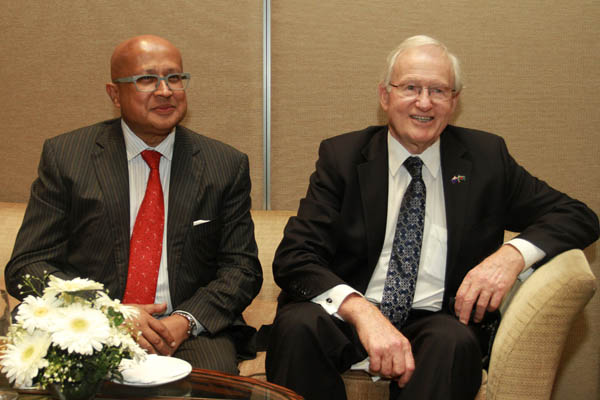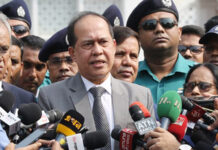Ex-prime minister of New Zealand James Bolger has said there is a scope for more university scholarships for Bangladeshi students to study in New Zealand, with a view towards benefitting both parties.
“One area where I do believe we can see greater cooperation (between New Zealand and Bangladesh) is in university scholarships for Bangladeshis to come and study in New Zealand. Your students get to learn in very good universities, and our system benefits from having a more diverse student body,” Bolger said in an interview with UNB recently.
Bolger, who was twice elected prime minister of New Zealand in the Nineties, was in Dhaka last week to gather support for his country’s bid to be elected as one of the 10 rotating members of the UN Security Council for 2015-16, in his new role as a special envoy of the current New Zealand premier John Key.
The vote to elect the 10 new rotating members of the Security Council for 2015-16 will be held in the UN General Assembly later this year. New Zealand, according to Bolger, will be standing on a platform that reflects their position as a country close to the emerging nations of the Asia Pacific, but sharing good, established relations with the West.
“The UN was of course founded in the aftermath of World War II, and as such it still reflects the world as it was back then. Hence, we are grouped with “Western Europe and others” and our nomination comes from that group, even though these days we are probably closer in terms of our dealings as a nation to Asia Pacific,” he said, adding that it would allow them to play a “balancing” role between the two groups.
Bolger also said New Zealand would look to use their place in the UNSC to push for reforms to the UN system, but cautioned that this would take time, and could only happen “incrementally”. But he sees the UN as still the best forum for the world to come together and tackle problems multilaterally, such as climate change.
“Now that there’s a recovery underway, much of the danger has passed and the world economy is doing much better, I am hopeful that it will allow countries to refocus on the challenge posed by global warming,” Bolger said.
He went on to advise more tolerance for Bangladeshis to make the best of democracy as a system of governance, reflecting upon the experience of New Zealand as one of the more mature democracies in the world today.
“Tolerance for others’ views, tolerance for others’ beliefs, tolerance for their wants and needs. And from I’ve been able to gather about your culture and reading about your history and everything else, tolerance is a feature of your peoples’ way of life throughout history. What you must focus on now is how to translate that into the political process.
“There will be teething problems, and you’re encountering some of them now, but overall, if you stick at it and find some way to imbue the politics with tolerance, you should do fine.”
Bolger also told UNB that the small existing population of Bangladeshis living in New Zealand are generally “good citizens”, and that his country’s experience of a proportional representation system of voting – aimed at tackling the problem of wasted votes in elections – had also been a good one since they implemented it in 1997.
Source: UNBConnect










